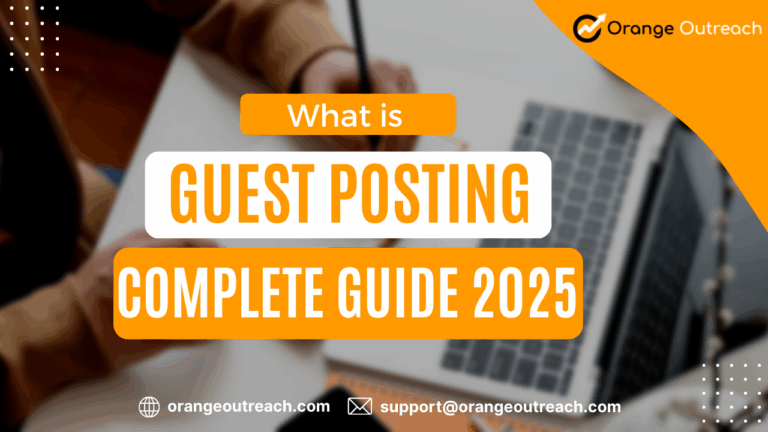Key Takeaways
- Guest posting is a white-hat SEO strategy where you write and publish content on another website that falls in your niche.
- Guest posting helps you increase your website traffic, increase authority and credibility, improve brand awareness, increase domain authority, and increase networking opportunities.
- Look for websites that allow guest posting by searching “write for us” + [your niche], “submit guest post” + [topic], or use tools like BuzzSumo, Ahrefs, or Semrush. Use Moz and Ahrefs to check if the website is worth collaborating with.
- Guest Posting can be beneficial if you find a host page with good domain authority (DA), create high-quality original content, and include natural backlinks without keyword stuffing.
- Focus on industry-relevant sites, avoid spammy or low DA sites, and promote your guest posts on all platforms to maximize visibility and strengthen relationships
Guest posting, also called ‘guest blogging,’ in SEO means writing and publishing your content on another website in your niche. This helps you build backlinks, boost your credibility, and increase targeted traffic to your website. Guest blogging SEO is an effective and white hat strategy to increase your online presence.
In the current digital age, where search engine optimization (SEO) is a key factor in increasing a website’s visibility and traffic, guest posting is a proven strategy that drives SEO success.
Despite the algorithm updates and the growing competition, guest posting is a component that continues to matter, as search engines highly value relevant and high-quality backlinks. Once you get it right, it can improve your website’s ranking in the search engine results page (SERP), increasing your authority in the industry.
This blog aims to serve as a detailed guide to help you understand guest posting, what it is, how it works, its relevance, and how you can get started. Understanding guest posting can be beneficial for business owners and writers alike; it is also helpful information for all, as it offers a deeper and clearer insight into how search engines assess websites.
What is Guest Posting in SEO?
Guest posting is a digital marketing and SEO strategy that involves you writing blogs for other websites in your industry. The goal of this tactic is to earn high-quality backlinks, increase visibility, and build credibility.
Under guest blogging SEO, you are required to provide valuable and relevant content to another site; in exchange, you get a backlink to your website. Search engines value high-quality backlinks; they view websites with high-quality backlinks as trustworthy and relevant websites, improving that website’s ranking in the SERP.
Guest posting serves three key purposes:
- Increase the backlinks to your website.
- Increase your website’s visibility on SERP.
- Increase your connections in the industry.
Search engines value websites that earn natural and relevant backlinks, and guest posting is a safe and sure way to get those backlinks.
What are the Benefits of Guest Posting?
Guest posting is a strategic SEO tool that is more than just a backlink; it provides lasting value. Here are some of the benefits of guest posting:
- Website traffic can increase by publishing on websites with a larger audience.
- The website’s authority and credibility increase by appearing on other reputable platforms.
- Brand awareness increases through consistent guest posting, making the brand more recognizable.
- Guest posting increases networking opportunities with industry peers.
- The overall domain authority of the website increases.
How Guest Posting Helps SEO
Guest posting is a key strategy under SEO that can improve your website by employing several factors that search engines prioritize. Here’s how:
Backlinks work as a vote of confidence from other websites in your niche. When your guest post backlinks to your site, search engines take that as a signal that your content is trustworthy and relevant. This increases your website’s ranking in the SERP.
When you are guest posting, you control the anchor text, which is the text that you hyperlink to. An anchor text that is used naturally and is optimized makes it easier for search engines to easily understand what your linked page is about.
If your website receives backlinks from reputable sites in your industry that search engines already value, it can quickly get discovered and indexed.
Guest posting on other websites that are part of the industry you are in can help search engines associate your website with that niche, improving your website’s topical niche.
How to Start Guest Posting: A Beginner’s Step-by-Step Guide
If you are just starting to get into SEO and are not sure how to start guest posting, here is a simple guide to help you out:
Step 1: Identify Your Niche
Search engines categorize websites according to their niche, be it fitness, beauty, tech, digital marketing, or finance. You need to set your niche and stick to it. The backlinks that you get by collaborating with other members of your industry will be relevant and valuable in your niche.
Step 2: Find Guest Posting Sites
You will need to conduct a simple search on search operators by typing in:
- “write for us” + [your niche]
- “submit guest post” + [topic]
- “guest post guidelines” + [industry]
You can also look into tools like BuzzSumo, Ahrefs, or Semrush to find other sites that accept guest posts and have good authority.
Step 3: Conduct a Search to Find if the Site is Worth Posting On
While guest posting with websites with good authority can benefit your website, posting with bad ones can do lots of harm. You can check the Domain Authority (DA) of the website you wish to guest post with on tools like Moz and Ahrefs; these sites can also show you the website’s spam score and organic traffic too. It is best to avoid websites that have low traffic, seem spammy, or are part of a private blog network (PBN).
Step 4: How to Pitch a Guest Post
A good pitch can help you form great relationships. You need to send a professional and personalized email to the site editor of the website you want to guest post on. In the said email, you need to briefly introduce yourself and mention what makes you admire the editor’s content; you can follow by pitching a few article ideas that can be relevant to their audience. It is best if you dig deeper and find and follow their guest post guidelines.
Step 5: Write High-Quality, Original Content
You need to create content that is engaging, informative, and unique. Rather than pushing your brand, you need to focus on adding value to the host site’s readers. Try to match the host site’s tone and style of writing. Using proper formatting like H1 and H2 headings, bullet points, and adding credible sources can increase the readability of your content, and search engines will also trust your content by doing so.
Step 6: Include a Natural Backlink
The backlink you add to your website should appear natural. This can be done by placing it within the content or in the author bio. The host site may have specific preferences for backlink placement, so it is best to follow their guidelines. The anchor link that you add needs to be relevant and not be overcrowded by keywords. Your link should not be a sales pitch but a helpful resource for the host site’s readers.
Step 7: Promote Your Guest Post
Once your guest post has been published, share it on social media, your website, and your email list. Tagging the host site where it was published can help increase visibility and strengthen your relationship with them. You could also use snippets of your blog and turn them into carousel posts for your LinkedIn and Instagram.
Guest Posting Do’s and Don’ts
While guest posting can be a boon when done right, even one small mistake can make it all crumble. To help you avoid common pitfalls, here is a quick dos and don’ts guide:
Dos
- Focus on guest posting with high-authority websites; having quality backlinks is better than having twice the number of backlinks from low-quality ones.
- Collaborate with sites that are relevant in your industry. Posting a fitness blog on an art host page will not increase your relevance.
- Only post high-quality blogs that are relevant to your niche and can be valuable for your readers.
Don’ts
- Avoid collaborating with spammy and irrelevant sites that seem to lack original content or are cluttered with ads. These sites will harm your SEO.
- Do not clutter your anchor text with keywords. This will signal to the search engine that your blog is using black-hat SEO techniques to rank higher, which can lead to penalties.
- Black-hat SEO tricks like putting paid links on low-quality blogs will become a problem for your blog’s ranking. Focus on uploading organic, relationship-driven guest posts instead.
Should You Do Guest Posting Yourself or Hire an SEO Expert?
Guest posting does not necessarily need to be done by you; it can also be done by availing the guest blogging services provided by SEO experts. You can choose to avail yourself of such services depending on your time, skill, and goals. Both approaches have their pros and cons.
Managing your guest posts gives you full control over your content, voice, and where it gets published. It is a cost-effective alternative that is usually ideal if you are just starting out. You will eventually learn how guest post outreach works, build your brand voice, and build your relationships directly.
However, managing your own guest blogging SEO might not be possible for everyone, as it can be time-consuming. You will be required to invest your time in researching blogs, sending pitches, writing tailored content, and following up with your collaborators, which can easily lead to burnout. If guest postings are not done correctly, bad backlinks can ruin what you have built so far.
This is why many businesses choose SEO experts who provide guest posting services. An SEO agency can speed up the whole process of guest posting, from finding high-authority sites to providing high-quality backlinks, bringing your SERP rankings up to the top.
Availing guest blogging services is the best move for businesses that see guest blogging as a long-term SEO strategy but don’t want to manage it themselves. Delegating such tasks to trusted experts allows businesses to save time and focus on their core job while also having a strong online presence.
Final Thoughts: Is Guest Posting Worth It in 2025?
Guest posting is absolutely worth it in 2025. When done with the right strategy, guest posting can be highly beneficial for your website. Guest posting provides long-term SEO value by building high-quality backlinks from reputable websites, driving targeted traffic to your website, and increasing your brand authority in your niche industry.
If you are just getting involved in guest blogging SEO, it is important to understand that success in SEO doesn’t come from shortcuts. In fact, shortcuts are likely to result in penalties. Whether you opt to handle your own guest posts or work with SEO experts, the key is to create value for the readers, the host site, and you.
Guest posting continues to be a powerful strategy to grow your online presence, that is, if you do it right.














